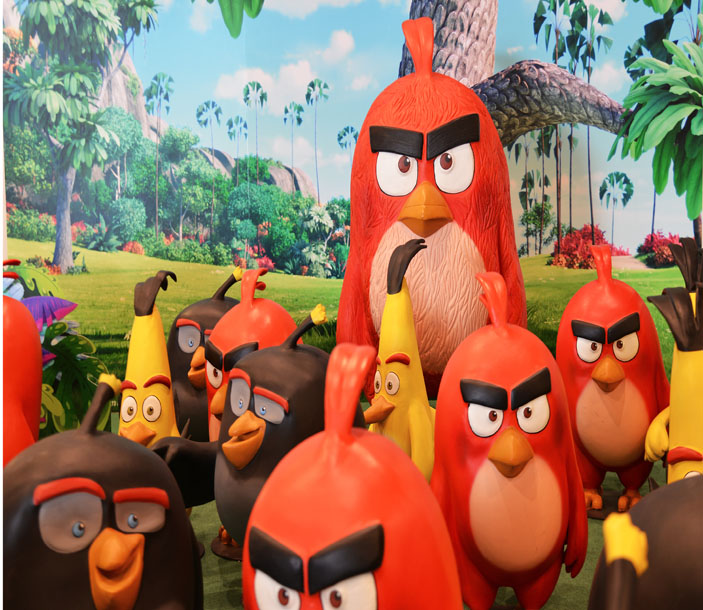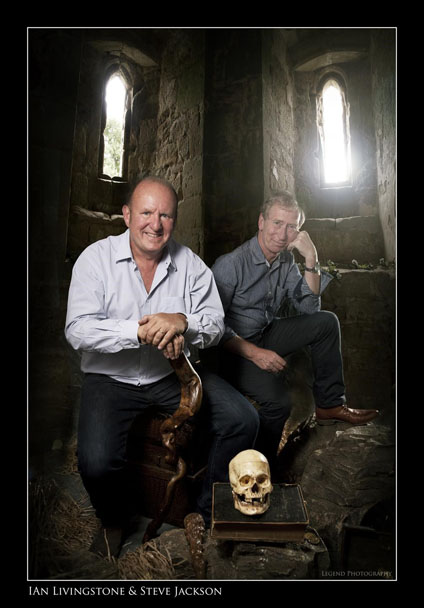
IAN LIVINGSTONE, CBE, is among the earliest video gamers, and is still going strong.
As a pioneer of the video games industry and a fantasy author, Livingstone lives in the realm of make belief and pure imagination.
Yet, he’s also got his feet firmly planted on the ground, doing his share to grow the $100 billion a year online games industry. “In 40 years, I’ve seen it grow extraordinarily,” says the 66-year-old entrepreneur.
“It’s still a relatively young industry, but it has had a strong cultural and social impact. It’s at the front and centre of the digital age.”
Livingstone makes no excuses for enjoying what he does.
“We are playful by nature. It’s natural.”
Livingstone wanted to be a games designer. “That was always a passion of mine. And I wanted to turn my hobby into a business. I love the world of imagination — monsters roaming, wizards, barbarians — which is a great setting for games.”
Livingstone is the co-founder of the Fighting Fantasy series of role-playing game books, and started distributing Dungeons & Dragons in Europe when it was first released. His involvement in the industry escalated from that point, and he is still immersed in it.
“I chair 10 games companies in the UK. I’m opening two Livingstone Academy schools. I’m writing another Fighting Fantasy book for its 35th anniversary. I’ve designed a couple of video games.
“Life is a game. There is no difference between work and play, for me.
“So, just follow you heart,” is his advice.
Livingstone was in Singapore to support the 2016 Merlion Animation Week (www.maw.sg).
IAN LIVINGSTONE MAKES 10 POINTS ABOUT THE VIDEO GAME INDUSTRY
1. Who Is The Video Gamer?
Contrary to popular belief, it’s not children who form the bulk of those playing games. The average age of console user is in the 20s and 30s. There are more males playing video games, but increasing numbers of women are coming in.
Games will ultimately reflect society in its make up. The content used to be male focused, but now there are games for everyone. When it first started, it was single-player games, then came the multi-player offline games. Now, it’s online, and being able to connect with people has been key. Playing with people around the world has transformed the industry.
2. Don’t Make Excuses
It doesn’t matter what the platform is, it’s about creativity. We sold 80 million copies of board games and books in the 1980s. We moved from the analogue to the digital world. And the advantage that technology has is that it now lets us reach consumers around the world.

3. Not Everything Flies
For every Angry Bird there are 10,000 dead birds out there.
There’s a lot of investment involved, but the investment community doesn’t write enough notes about it. I think that will change since mobile games will bring it to people’s attention.
4. Building Community
The video game industry only started in the late 1970s. It is evolving, not just visually, but in content. There is more ethnic and gender diversity among video gamers. You are now able to contextualise and simulate anything, allowing for more cultural diversity. Games are a great way of bringing people together.
5. Be Your Own Boss — But It Isn’t Easy
I’ve only ever wanted to work for myself. If you’re passionate and follow your heart, there’s no reason you can’t set up your own business. If you can’t get finance, you have to carry on. It’s about doing something you really want to do. It was simpler back when I started, but not easier. I couldn’t get viral spread. There was no industry in place. I had to make it up as I went along.

6. The Overlooked Industry
When I first started, bank managers were not interested in funding fancy board games. My business partner, Steve Jackson, and I had to live in a van for three months.
The same problems exist today.
There is a great misconception that the games industry is not seen as a real industry.
People don’t see its value. It embraces new technology, it’s a marriage of arts and science; it is a complex product to put together. It requires special skills and investment.
Why isn’t it embraced?
Our assets are intangible. We don’t make widgets. We have small studios with people operating behind computers. We are writing millions of lines of code. Clash of Clans had 12 people on the team. But it made $12 million revenue per day.
7. The Next Big Thing?
The beauty of this industry is you never can predict the next big thing. Dungeons & Dragons transformed games with role playing. Mindcraft unleashed a new level of creativity. Tomb Raider brought in a female protagonist. And now you play with people around the world. There are so many milestones in this industry, which act as incentives.
8. Will Brexit and Donald Trump affect the industry?
The isolationist world is not good.
The world needs free market not tariffs and barriers. It’s important that the UK has access to European and global talent. And from a marketing point of view it’s vital to have unrestricted access to the EU market. Same thing applies to Trump. I hope the games industry is not affected. Fortunately, most content is delivered digitally.
9. How Can Singapore Plug And Play?
Singapore has the ability and tech-centric education system. It’s just the games design part that is not in abundance. It all comes down to a creative education.
There is a heavy reliance on rote learning. Children should embrace more soft skills.
For me it should not be a case of choosing between science and arts. Creative thinking helps all industries. There is always more than one solution to a problem. The statistics show that 65% of children will have jobs that don’t exist today. They must have the meta skills they can apply to any problem.
10. Go Silver Surfers!
It’s better to play on a tablet than swallow one.
The silver generation should go out and play games. It can be used in a positive sense.





















